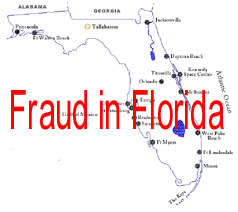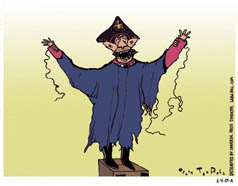Speaking of Rude...
...I'm going to see Fahrenheit 9/11 this afternoon. I've read about it, seen the trailer, and witnessed numerous risible big media attempts trash the film for not being "objective", as if the New York Times and Washington Post didn't publish filth from Safire and Krauthammer every day. Isn't Michael Moore entitled to a cinematic editorial?
Again, I haven't seen the movie yet, but somehow I think I'll come out feeling much like David Edelstein did:
In one scene, his camera homes in on a Flint, Mich., woman weeping over a son killed in Iraq, and the effect is vampirish. After the screening, a friend railed that Moore was exploiting a mother's grief. When I suggested that the scene made moral sense in the context of the director's universe, that the exploitation is justified if it saves the lives of other mothers' sons, my friend said, "When did you become a relativist?"
I'm troubled by that charge—and by the fact that we nearly came to blows by the end of the conversation. But when it comes to politics in a time of war, I think that relativism is, well, relative. Fahrenheit 9/11 must be viewed in the context of the Iraq occupation and the torrent of misleading claims that got us there. It must be viewed in the context of Rush Limbaugh repeating the charge that Hillary Clinton had Vince Foster murdered in Fort Marcy Park, or laughing off the exposure of Valerie Plame when, had this been a Democratic administration, he'd be calling every day for the traitor's head. It must be viewed in the context of Ann Coulter calling for the execution of people who disagree with her. It must be viewed in the context of another new documentary, the superb The Hunting of the President, that documents—irrefutably—the lengths to which the right went to destroy Bill Clinton. Moore might be a demagogue, but never—not even during Watergate—has a U.S. administration left itself so open to this kind of savaging.
Along with many other polite liberals, I cringed last year when Moore launched into his charmless, pugilistic acceptance speech at the Academy Awards. Oh, how vulgar, I thought—couldn't he at least have been funny? A year later, I think I might have been too hard on the fat prick. Six months before her death in 1965, the great novelist Dawn Powell wrestled in her diary with the unseemliness of political speech during an "artistic" event: "Lewis Mumford gave jolt to the occasion and I realized I had gotten as chicken as the rest of America because what he said—we had no more right in Vietnam than Russia had in Cuba—was true but I did not think he should use his position to declaim this. Later I saw the only way to accomplish anything is by 'abusing' your power." Exactly. Fahrenheit 9/11 is not a documentary for the ages, it is an act of counterpropaganda that has a boorish, bullying force. It is, all in all, a legitimate abuse of power.




0 Comments:
Post a Comment
<< Home